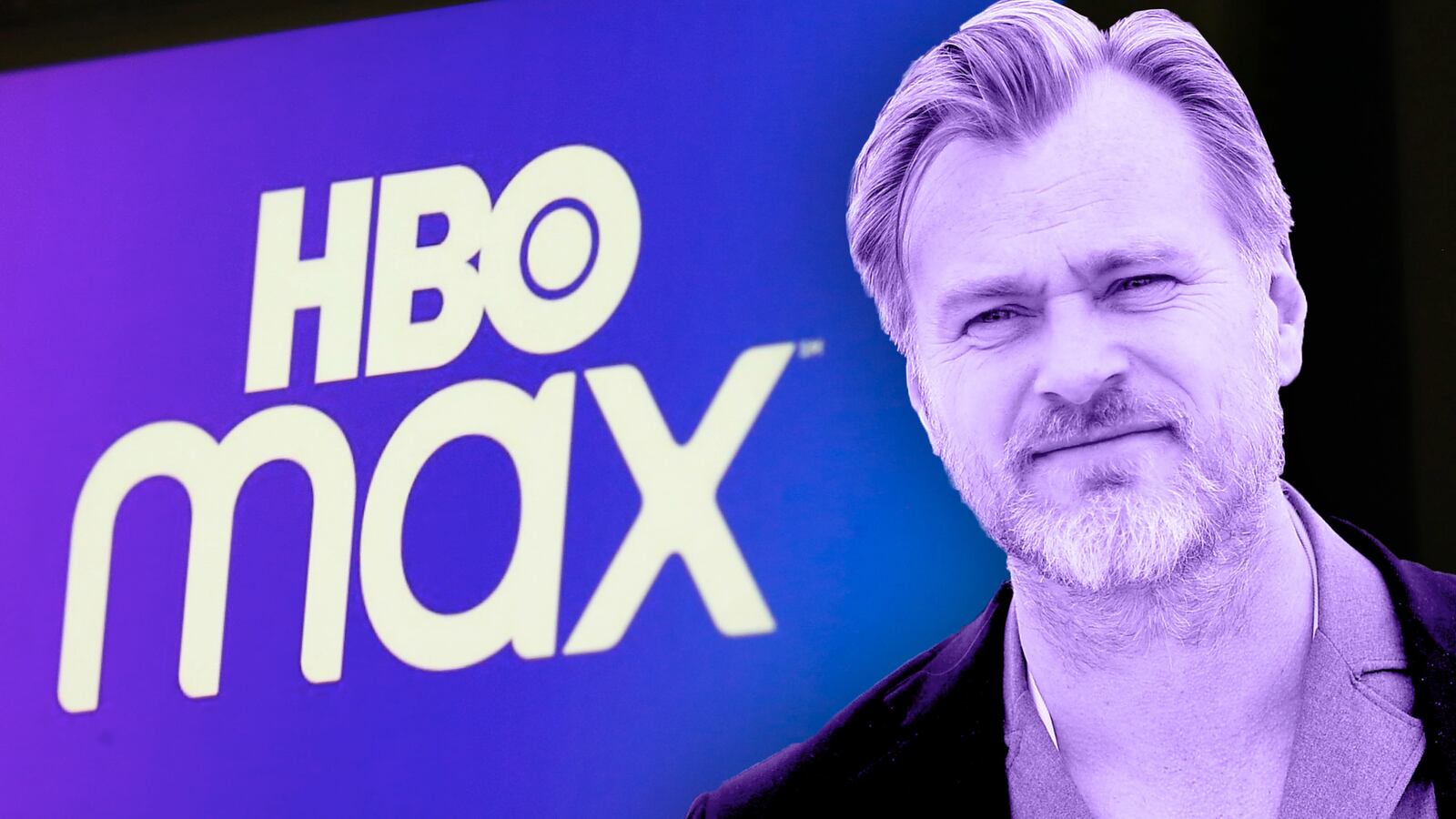Marlow: Well, here we are: debating the great Filmmaking vs. Streaming War of 2020. As you’ve all probably heard, last week WarnerMedia—which controls Warner Bros., HBO, Cinemax, and Turner Broadcasting, among other entities—upended the film industry in announcing that its entire 2021 theatrical slate would debut on both HBO Max and in theaters—a one-month HBO Max run before leaving the platform and playing in theaters domestically and abroad, thereby crushing traditional theatrical-window requirements.
Kevin: Given how things have been progressing during the pandemic, it’s both the most shocking and most inevitable news—which is to say that it’s just about a perfect finale to this combustible hell-year.
Marlow: Cinema chaos. So, the Warner Bros. slate headed to HBO Max includes blockbusters like Wonder Woman 1984, Godzilla vs. Kong, The Suicide Squad, Dune, Matrix 4, Space Jam: A New Legacy, and In the Heights, as well as the Oscar-courting Judas and the Black Messiah, and in a strange and ironic twist, the Sopranos prequel The Many Saints of Newark.
Kevin: A veritable orgy of sequels, reboots, and adaptations, streamed directly from your home! That, however, speaks to how explosive this decision is. For better or worse, these are the projects that still actually make money at the box office and keep theaters open.
Marlow: And that poor Sopranos movie, which will never leave HBO! WarnerMedia appeared to make the decision to juice subscriptions to its new streamer HBO Max, which has attracted a measly 8.6 million signups since launching on May 27 for $14.99 a month (a dollar more than Netflix). It’s a crazy-low number since another 28.7 million people subscribe to regular HBO and HBO Max comes with it, so they haven’t even bothered to switch it on. Anyway, the move has reportedly rankled the talent side, who say they were completely kept in the dark about the move, with Christopher Nolan, who’s been with Warner Bros. since 2002’s Insomnia, telling The Hollywood Reporter’s Kim Masters, “Some of our industry’s biggest filmmakers and most important movie stars went to bed the night before thinking they were working for the greatest movie studio and woke up to find out they were working for the worst streaming service.” Yikes!
Kevin: Basically, this industry-stabilizing drama between Nolan and WarnerMedia is much like a typical Nolan film itself: the biggest people in Hollywood all involved in something very grand, loud, and seemingly important—and yet also nearly impossible to understand. You can sort of simplify this for the non-showbiz everyman by distilling the whole battle to the simplest truth about Hollywood: Everyone is being a selfish ass, and no one will actually win.
Marlow: Christopher Nolan has not made any friends this summer. I am just counting the days till he appears on Joe Rogan’s podcast to complain about the cinemas not reopening or something.
Kevin: I find Nolan’s statement to be particularly exasperating. Given the push to have Tenet be the movie that reopened theaters this summer—and, it hoped, save them—the minute the HBO Max decision came out, everyone in the business could only imagine that he would have a massive, somewhat hysterical reaction to the news. For him to be so publicly petulant about it with that dig at “the worst streaming service” is frustrating because the pettiness makes headlines and obscures what is a valid and important point he’s making, a point that people who might be glad to save money and watch Wonder Woman 1984 from home might not intuit right away. This will have a seismic effect on moviemaking, from budgets, to what gets greenlit, to ambition and the future of cinemas. And that’s not to mention that the way WarnerMedia went about it, not informing the talent and filmmakers involved, was shady to the point of being dastardly.
Marlow: While as a consumer, a part of me is giddy over the news that I’m now able to view all these films whilst trapped at home—though watching Villeneuve’s Dune on a tiny screen seems all kinds of wrong—I’m not sure how this makes business sense for HBO Max. It seems they’re trying to court Wall Street with this move, which is giddy over the prospects of streaming services, and in the process has alienated all their talent. According to Deadline, Wonder Woman 1984 (which cost $200 million to make) will need to make 40 percent more than Tenet’s global haul of $357.8 million just to break even, and that’s just one of the films in play here. So it looks like WarnerMedia is willing to essentially gamble their domestic box office for all these movies—likely billions of dollars—on HBO Max subs. They’re basically saying that they don’t think there will be mass-distribution of a vaccine by summer 2021 that could allow cinemas to reopen and the theatrical movie biz to stabilize.
Kevin: HBO Max not really making sense is pretty much the theme of its rollout, which has been a disaster. That’s reflected in its poor subscriber numbers, despite the fact that—in the face of Nolan’s branding it as “the worst streaming service”—it probably has become what I think is the best. Or at least it has the best content vs. value.
Marlow: Don’t forget about all that sweet Disney+ content!
Kevin: Still, there’s the issue that, even after this announcement of the movie slate coming to the service, people who already have it because they subscribe to HBO don’t realize they have it. Or, because they use Roku for streaming, can’t access it despite being a subscriber. The messaging has been all over the place; I still think there are people who don’t understand that it’s not just HBO. (Which also speaks to the way the service has diluted the HBO brand.) All that said, it’s incredibly frustrating that a company like WarnerMedia with such a rich and in-demand library of great content just keeps royally fucking up the rollout of its marquee streaming service. To give credit where it’s due, Nolan is probably right to have, at the very least, little faith in its plan.
Marlow: And while it’s hard to take what Christopher Nolan is saying here seriously given the behavior surrounding Tenet over the summer, where the release team behind Tenet was basically pressuring critics to screen his movie in theaters despite the rather obvious transmission risks—at one point, they were even encouraging New York-area critics to cross state lines during the COVID-19 pandemic to Connecticut to screen the movie—he does have a point. Why didn’t HBO Max follow in Disney+’s footsteps and inform their top-tier talent that their projects were going to streaming? That seems like a colossal misstep—and as THR reported, may open the door to legal challenges over profit participation, etc.

TNT, TBS, truTV, HBO & HBO Max Content Acquisition EVP Michael Quigley, HBO Max CCO and TNT, TBS, & truTV President Kevin Reilly and HBO Max Head of Original Content Sarah Aubrey appear onstage during the HBO Max executive session segment of the 2020 Winter Television Critics Association Press Tour at The Langham Huntington, Pasadena, on January 15, 2020 in Pasadena, California.
Emma McIntyre/GettyKevin: Is it too much for Bugs Bunny to ask to have a little bit of warning that Space Jam 2 isn’t going to be seen exclusively in theaters as he intended? But jokes aside, that probably hints at the most existential part of this whole thing. WarnerMedia is, like you said, clearly not optimistic about the world returning to normal anytime soon. But let’s strap on our Pollyanna bonnet and say that it does. Having the option to stream at home or see in theaters at the same time is the experiment I think everyone in the industry saw coming down the pipeline. Given the (safe) option, do people have the desire to go to the movies anymore? Or are we officially streaming converts, and the new era of movie watching has officially begun? There’s no denying that we were/are headed there. But I think no one wants to admit that it’s happening so soon.
Marlow: I have so many gripes with HBO Max as a user—in particular its interface, which is very difficult to navigate, doesn’t provide scroll-over trailers like Netflix, and doesn’t seem possessed of Netflix’s algorithm to determine recommendations, etc. While I do think HBO Max was put in a difficult position here owing to the ongoing pandemic, which has claimed over 270,000 lives in America alone, it seems like they may have jumped the gun when it comes to this 2021 game plan, especially given how they’ve already begun vaccine distribution in the U.K., and one would hope that the U.S. will get their distribution-act together once the Biden/Harris administration takes over in January. (The Trump administration has already screwed the pooch.) While streaming may be our future, I don’t think the theatrical movie biz will fold in the next five to ten years, and agree with filmmaker (and HBO Max contractor) Steven Soderbergh, who recently told The Daily Beast:
<p><i>Let’s be clear: there is no bonanza in the entertainment industry that is the equivalent of a movie that grosses a billion dollars or more theatrically. That is the holy grail. So the theatrical business is not going away. There are too many companies that have invested too much money in the prospect of putting out a movie that blows up in theaters—there’s nothing like it. It’s all going to come back. But I think Warners is saying: not as soon as you think.</i></p>
Following publication, a representative for Christopher Nolan provided this statement to The Daily Beast: “Christopher Nolan had nothing to do with how the film was screened for critics and certainly would not approve of anyone being encouraged to cross state lines to see it. The plan was designed and implemented entirely by Warner Bros.”



